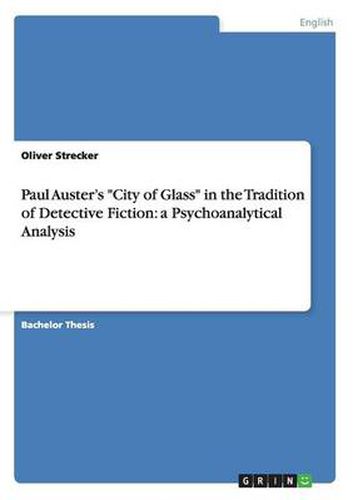Readings Newsletter
Become a Readings Member to make your shopping experience even easier.
Sign in or sign up for free!
You’re not far away from qualifying for FREE standard shipping within Australia
You’ve qualified for FREE standard shipping within Australia
The cart is loading…






Bachelor Thesis from the year 2012 in the subject English Language and Literature Studies - Literature, grade: 1,0, University of Dusseldorf Heinrich Heine (Philosophische Fakultat), language: English, abstract: The topic of this paper is to examine the detective novel City of Glass, published by Paul Auster in 1985, from a psychoanalytical point of view. This analytic approach, combining both detective fiction and psychoanalysis, is more natural than might appear at first glance. After all, the modus operandi of the psychoanalyst and the detective are quite similar. A close contemplation of details, a search for hints and finally a development of a theory that unites the small signs in a big picture are crucial steps in both fields. Sigmund Freud laid out the common importance of details as following: And if you were a detective engaged in tracing a murder, would you expect to find that the murderer had left his photograph behind at the place of the crime, with his address attached? Or would you not necessarily have to be satisfied with comparatively slight and obscure traces of the person you were in search of? So do not let us underestimate small indications, by their help we may succeed in getting on the track of something bigger. Furthermore, Freud emphasized how psychoanalysts are practicing a kind of detective-work as well: We have to uncover psychic material; and in order to do this we have invented a number of detective devices. Due to those parallels, psychological studies of mystery and detective narratives have a long and varied history. Most of these approaches have analyzed traditional detective fiction. Auster’s very untraditional detective novel, however, plays with the conventions of the genre and creates its very own detective universe, a confusing play of constantly changing identities. This universe shows parallels to the world-view of the French psychoanalyst Jaques Lacan, as: Lacanian psychoanalysis offers a theory of the subject th
$9.00 standard shipping within Australia
FREE standard shipping within Australia for orders over $100.00
Express & International shipping calculated at checkout
Bachelor Thesis from the year 2012 in the subject English Language and Literature Studies - Literature, grade: 1,0, University of Dusseldorf Heinrich Heine (Philosophische Fakultat), language: English, abstract: The topic of this paper is to examine the detective novel City of Glass, published by Paul Auster in 1985, from a psychoanalytical point of view. This analytic approach, combining both detective fiction and psychoanalysis, is more natural than might appear at first glance. After all, the modus operandi of the psychoanalyst and the detective are quite similar. A close contemplation of details, a search for hints and finally a development of a theory that unites the small signs in a big picture are crucial steps in both fields. Sigmund Freud laid out the common importance of details as following: And if you were a detective engaged in tracing a murder, would you expect to find that the murderer had left his photograph behind at the place of the crime, with his address attached? Or would you not necessarily have to be satisfied with comparatively slight and obscure traces of the person you were in search of? So do not let us underestimate small indications, by their help we may succeed in getting on the track of something bigger. Furthermore, Freud emphasized how psychoanalysts are practicing a kind of detective-work as well: We have to uncover psychic material; and in order to do this we have invented a number of detective devices. Due to those parallels, psychological studies of mystery and detective narratives have a long and varied history. Most of these approaches have analyzed traditional detective fiction. Auster’s very untraditional detective novel, however, plays with the conventions of the genre and creates its very own detective universe, a confusing play of constantly changing identities. This universe shows parallels to the world-view of the French psychoanalyst Jaques Lacan, as: Lacanian psychoanalysis offers a theory of the subject th